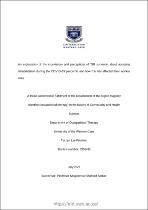An exploration of the experiences and perceptions of TBI survivors about accessing rehabilitation during the COVID-19 pandemic and how this has affected their worker roles
| dc.contributor.advisor | Soeker, Mogammad Shaheed | |
| dc.contributor.author | Petersen, Tarryn Lee | |
| dc.date.accessioned | 2022-11-07T09:31:44Z | |
| dc.date.issued | 2022 | |
| dc.identifier.uri | http://hdl.handle.net/11394/9414 | |
| dc.description | >Magister Scientiae - MSc | en_US |
| dc.description.abstract | Traumatic brain injury (TBI) often results in residual cognitive, behavioural, physical, and functional impairments that may influence the person’s independence in most areas of occupation, including work. Few resources are available for the rehabilitation of patients with TBI in South Africa, and access to rehabilitation facilities in the public sector is limited. On 7 January 2020, ‘Severe Acute Respiratory Syndrome Coronavirus 2’ (SARS-CoV-2) was confirmed as the causative agent of ‘Coronavirus Disease 2019’ or COVID-19. On 15 March 2020, the president of South Africa, Cyril Ramaphosa, declared a national state of disaster. | en_US |
| dc.language.iso | en | en_US |
| dc.publisher | University of the Western Cape | en_US |
| dc.subject | Covid-19 | en_US |
| dc.subject | Occupational Therapy | en_US |
| dc.subject | Public health | en_US |
| dc.subject | Employment | en_US |
| dc.subject | South Africa | en_US |
| dc.title | An exploration of the experiences and perceptions of TBI survivors about accessing rehabilitation during the COVID-19 pandemic and how this has affected their worker roles | en_US |
| dc.rights.holder | University of the Western Cape | en_US |
| dc.description.embargo | 2023 |

